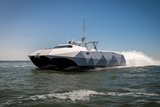SRC enhances UK EW footprint
SRC has launched a new UK company-based company – SRC UK - to enhance electronic warfare support for the British armed forces.
The company will have a UK based team to support the UK’s electronic warfare requirements, from mission intelligence and engineering services to the development of threat simulator receivers that assist with airborne training and operations.
Paul Tremont, CEO of SRC, said: ‘We are excited to be launching SRC UK to continue our strong relationship supporting Her Majesty’s Armed Forces. We are confident that [Stephen Davies, managing director of SRC UK] will provide leadership that will propel SRC UK to have a major role in supporting the EW modernisation effort to help protect warfighters.’
More from Digital Battlespace
-
![Thales looks to boost DigitalCrew system through AI and human-machine teaming trials]()
Thales looks to boost DigitalCrew system through AI and human-machine teaming trials
The Thales DigitalCrew package, first unveiled at last year’s Defence IQ International Armoured Vehicles conference, is designed to merge imaging and apply a layer of decision-making and observation algorithms to support crew and other personnel.
-
![Babcock nears first customer for Nomad AI translation tool]()
Babcock nears first customer for Nomad AI translation tool
Nomad can provide militaries with real-time intelligence, saving critical time on the battlefield.
-
![AUSA 2025: Israel’s Asio Technologies to supply hundreds of improved Taurus tactical systems]()
AUSA 2025: Israel’s Asio Technologies to supply hundreds of improved Taurus tactical systems
Taurus operates alongside the Israel Defense Forces’ Orion system which supports mission management across tens of thousands of manoeuvring forces, from squad leaders to battalion commanders.
-
![AUSA 2025: Kopin pushes micro-LED plans as China moves faster]()
AUSA 2025: Kopin pushes micro-LED plans as China moves faster
The plan for the new displays follows fresh investment in Kopin’s European facilities by Theon and an order for head-up displays in fielded aircraft, with funding from the US Department of Defense.
-
![AUSA 2025: Persistent Systems to complete its largest order by year’s end]()
AUSA 2025: Persistent Systems to complete its largest order by year’s end
Persistent Systems received its largest ever single order for its MPU5 devices and other systems earlier this month and has already delivered the 50 units to the US Army’s 4th Infantry Division.
-
![Aselsan brings in dozens of companies and systems under the Steel Dome umbrella]()
Aselsan brings in dozens of companies and systems under the Steel Dome umbrella
Turkey has joined the family of countries attempting to establish a multilayered air defence system with government approval in August 2024 for the effort landed by Aselsan. Dubbed Steel Dome, the programme joins Israel’s Iron Dome, the US Golden Dome, India’s Mission Sudarshan Chakra and South Korea’s low-altitude missile defence system.

























